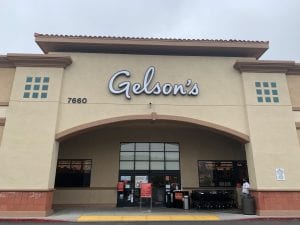
CAROLINA ALBAN-STOUGHTON 
DIRECTOR OF COMMUNICATION & ENGAGEMENT
CARLSBAD CHAMBER OF COMMERCE
Interviewing:
CLAUDE JONES
SENIOR DIRECTOR OF ENGINEERING
WALMART LABS
On March 17, Gelson’s Market in La Costa was one of the first ones in our area to announce special shopping hours for seniors only. The measure, which in a different context could’ve been perceived as borderline discriminatory or at the very least strange, was just an example of a company adjusting its practices to support a high risk population. “We’ve been, of course, closely monitoring it all and following the CDC guidelines to the tee. Serving the local communities is truly in our DNA so this will be something we will always focus on!,” said Gelson’s Markets Marketing Director, Jake Cheung.
The transformation of how we shop, when we shop and what we shop for has been something fascinating to watch in the last couple of months – with seniors only hours, being just the tip of the iceberg. While consumer behavior shifted dramatically as public health orders went into effect, stores rushed to accommodate those changing patterns.
Senior Director of Engineering at Walmart Labs (the tech arm of Walmart), Claude Jones, has seen those shifts first hand. “If we are thinking about shopping patterns as it relates to what people buy and the amount of what people buy, yeah there’s a huge difference. When you start looking at consumable goods – in online grocery for instance – people would buy them when they needed them. Like every two weeks they would go to the grocery store,” said Jones. However, social distancing threw those predictable patterns away. “Even before COVID really started becoming a household name or a pandemic, people were just hoarding.” Jones noticed the consumption spike as many stores made one of their first adjustments.“Even today you have companies that have to put limits on what people can purchase just so that there’s enough for shoppers that are coming in.”
Additional retail changes, such as stores not accepting returns, or frequent sanitation of high-touch surfaces, have not only affected large essential supermarkets and stores like Gelson’s and Walmart. Smaller, non-essential retail stores, have also tried to innovate to make sure their businesses stay afloat. Such is the case of TROVE Markeplace in downtown Carlsbad. “We did not have an online store before the shut down and relied on social media (Facebook and Instagram) to post our fabulous finds,” said TROVE owner, Carrie Moore. “The shut down has given us this time to focus on the new online store that will provide our amazing customers near and far the ability to shop our treasures.”
While moving to sell online may seem very tempting and possibly the quickest solution to continue to run a business, Jones suggests that there is no cookie cutter approach when trying to re-start a company during COVID-19. He says that the shift really depends on the type of business, and the process starts with a simple self-examination. “The question that I would ask is, ‘how would you best engage with your customers?’ So if you have a product that people need to kind of touch and feel to figure out what’s going on, what would the equivalent of that be if you were going to shift your business online?” This transformation would also include delivery and shipping considerations. “The conveniences that might exist in store, how would you replicate that online?”
 A few years ago, and without having a global pandemic in mind, Walmart started offering a service called online grocery pick up. This sort of hybrid of in-store experience combined with e-commerce has become incredibly handy to accommodate consumers that might be hesitant to step into a store, but who still need the immediacy of the in-store purchase. This option is currently available in 3,000 Walmart stores across the U.S. “We are leveraging technology in a way that really allows people to feel comfortable if they have to shop, or gives them different options to shop.”
A few years ago, and without having a global pandemic in mind, Walmart started offering a service called online grocery pick up. This sort of hybrid of in-store experience combined with e-commerce has become incredibly handy to accommodate consumers that might be hesitant to step into a store, but who still need the immediacy of the in-store purchase. This option is currently available in 3,000 Walmart stores across the U.S. “We are leveraging technology in a way that really allows people to feel comfortable if they have to shop, or gives them different options to shop.”
In a much smaller scale, Moore was able to also do her version of curbside pick ups, when she decided to start selling hand-made facemasks. “We posted them on our Facebook and Instagram accounts. Not ten minutes later the announcement was made on the news that masks were mandatory for some and suggested that we all wear them when out. We received over 500 orders in a five-day period. I make appointments for pickups and will ship anywhere.”
Gelson’s has been doing the same with food. “We’ve just launched Gelson’s ‘Kitchen Meals to Go’ for customers to feed their families at home and without entering the store. Customers can now order online and pick up their pre-paid meal the same day from their local Gelson’s location,” said Cheung.
EMOTIONS AS DECIDING FACTOR
One aspect that businesses should consider when making decisions on how to re-start is the emotions that COVID-19 as a global pandemic evoke in consumers. “With everything that you read in the media, how deadly this is being portrayed to be, and the impact it’s having on a number of lives across our country, if they [officials] were to say next week that ‘hey everything’s good to go, go outside’, how many Americans would still maybe have the fear that ‘I’m still going to wear a mask because you never know’,” said Jones. He points out that when companies re-open, consumers and clients may be hesitant to go back to life as it was before COVID-19. Jones believes that the perceptions of the current situation and how it’s impacted our lives, are “going to take some time to subside.”
Therefore, things like cash register shields and markings on store floors to control distance between customers, may be long-term changes to give customers the sense of protection. “I feel what’s going to happen is there’s going to be a lot of innovation, and this is what I would say for companies and entrepreneurs that are kind of in a rut right now, ‘how are they reinventing themselves to take advantage of where the future might go?’ And start marketing themselves now because in the next, let’s say six or seven months, the world, as we know it, is going to change.”
For the full interview with Claude Jones, go to the Carlsbad Chamber of Commerce YouTube channel: https:// youtu.be/t9g4g75VL2I
